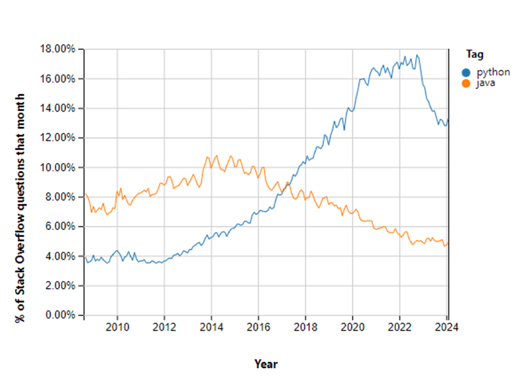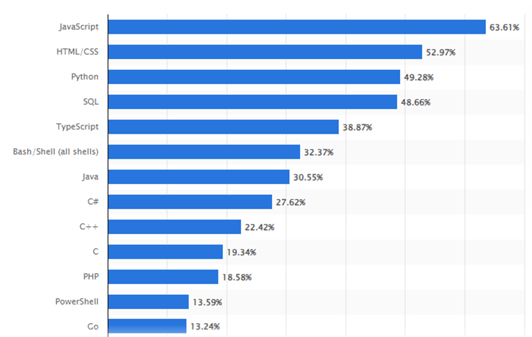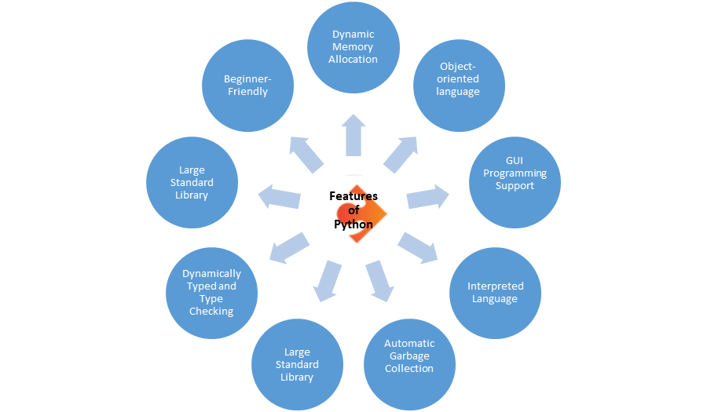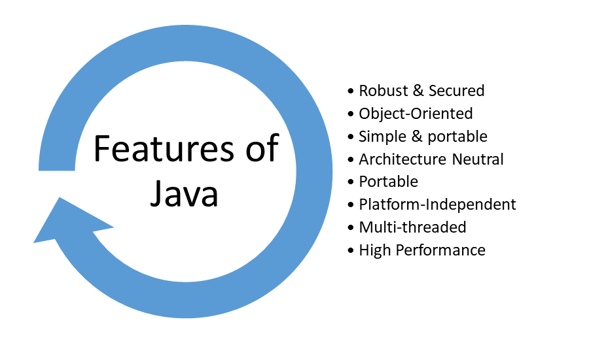Blog overview: In our latest blog post, we delve into the age-old debate: Java vs Python for web development. Discover the strengths and weaknesses of each language and find out which one reigns supreme for your next project. Let Clarion Technologies be your guide in navigating this crucial decision. Read on to make an informed choice and elevate your web development endeavors.
Are you facing a dilemma in selecting the appropriate programming language, weighing the merits of Python against Java? Various crucial factors come into play when determining the most suitable programming language for your organizational requirements. Delve into this comprehensive examination of Python vs. Java to arrive at an educated choice.
In the realm of web development, the selection of a programming language holds immense significance, fundamentally altering the approach developers adopt toward a given web project. When considering prominent programming languages like Python and Java, the decision-making process for web development can become intricate. Java, renowned as a general-purpose, class-based, and object-oriented programming language, boasts robust performance and speed. Conversely, Python, characterized by its high-level nature, interpreted execution, and dynamic typing, shines in terms of simplicity, scalability, and code readability.
Let's dive into this article and explore a quick intro to both languages. We'll also compare the basic concepts of each, but first, let's check out their popularity.
Java vs Python: Popularity
Java vs Python: Popularity Comparison

According to StackOverflow Trends (the graph above), there has been a notable surge in Python's popularity within the developer community. Additionally, a report from Statista reveals that Python has secured the third position among the most utilized programming languages worldwide as of 2025. In contrast, Java ranks seventh with a popularity of 30.55%. Consequently, numerous developers lean towards Python for software development and data analysis-oriented tasks.
Java vs Python: Popularity Comparison
According to StackOverflow Trends (the graph above), there has been a notable surge in Python's popularity within the developer community. Additionally, a report from Statista reveals that Python has secured the third position among the most utilized programming languages worldwide as of 2025. In contrast, Java ranks seventh with a popularity of 30.55%. Consequently, numerous developers lean towards Python for software development and data analysis-oriented tasks.

Let's delve into the enduring discourse surrounding Python versus Java in web development, meticulously examining their respective advantages and drawbacks, with a particular focus on their primary distinctions.
What is Python?
Python, crafted by Guido van Rossum, is a high-level, interpreted, and object-oriented programming language with dynamic semantics. Originally introduced in 1991, Python stands out for its readability, dynamic typing, and garbage collection features.
Python supports various programming styles, including object-oriented, structured, and functional programming. It's often the top choice for Rapid Application Development, due to its built-in data structures, dynamic typing, and binding.
One of Python's standout features is its user-friendliness, making it highly accessible for beginners. Its capability to handle complexity efficiently allows newcomers to grasp programming concepts without getting bogged down in intricate details. Furthermore, Python frameworks are neatly categorized into three types: Full Stack Framework, Microframework, and Asynchronous Framework.
#1. Features of Python

#2. Python for Web Development: Advantages and Challenges
Python serves as a versatile tool for creating a wide range of programs, including web solutions. Let's explore the compelling reasons why developers opt for Python over Java in web development. The primary benefits of Python for web development encompass:
- User-friendly syntax: Python's straightforward syntax makes it ideal for writing, maintaining, and debugging code, particularly in extensive projects. Additionally, novice developers can leverage its simplicity to swiftly grasp programming concepts.
- Dynamic typing and interpreted nature: Python's dynamic typing allows variables to hold data types determined at runtime, streamlining code writing and reducing time spent on type-checking. Being an interpreted language, Python enables immediate execution of code without the need for a compilation step, unlike Java. Robust library and ecosystem: With a vast and active developer community, Python offers ample support, resources, and tutorials online. Hire Python Developers as it boasts a rich ecosystem of frameworks like Flask and Django, facilitating the rapid and efficient development of web applications.
While Python's extensive community support, intuitive syntax, and execution speed offer numerous advantages for web development, it's essential to acknowledge some challenges, including:
- Potential runtime errors: Despite the convenience of dynamic typing, it may result in runtime errors if the variable's data type differs from what was anticipated. Managing such errors, especially in large projects with numerous variables, demands meticulous testing and debugging when you hire python coders.
- Performance constraints: As an interpreted language, Python's performance may not match that of compiled languages like Java, posing limitations for large-scale web applications.
In summary, while Python presents a plethora of benefits for web development, it's vital to address potential challenges to ensure smooth and efficient project execution.
#3. When to use Python?
Python finds utility in various domains including web development, software development, task automation, data visualization, and data analysis. Due to its user-friendly nature, Python has garnered popularity among beginners and non-programmers, such as scientists and accountants, who employ it for data management tasks.
Python is applied in:
- Data analysis, data visualization, and machine learning
- Software development and web development
- Automation or scripting
- Software testing and prototyping
What is Java?
Java is a high-level, class-based, object-oriented programming language primarily used to develop web applications. Originally developed by Sun Microsystems, Java offers developers the "write once, run anywhere" concept. Over time, Java has transitioned from simple text pages to pages incorporating video and animation.
#1. Features of Java

#2. Java for Web Development: Advantages and Challenges
When comparing Java and Python head-to-head for web development, it's prudent to delve into the benefits and challenges of each. Java presents numerous advantages that are particularly advantageous for web development:
- Strong typing: Java is a strongly typed language, meaning variables declare their data type explicitly upon creation, aiding developers in identifying errors early in the development cycle.
- Scalability: Designed with scalability in mind, Java is a favored choice for large-scale web applications. Its class-based inheritance model, coupled with support for multithreading and dynamic linking, simplifies the development of complex and scalable web applications.
- Thriving community and robust support: Java boasts a sizable and active developer community, ranking among the top three programming languages sought after by recruiters in 2025, alongside Python and JavaScript. Furthermore, java web development services company leverages its rich ecosystem of libraries and frameworks streamlines the development of web applications.
While the benefits are apparent, it's essential to acknowledge the existing challenges, which can influence the Python versus Java for web development decision:
- Complexity and verbosity: Java is notorious for its verbosity, which can pose readability challenges, especially in projects featuring numerous classes and methods. Additionally, navigating through legacy code or managing complex infrastructure can prove challenging.
- Large-scale applications can hamper performance: As web solutions become more resource-intensive, Java's performance may suffer, particularly in complex applications, presenting a hurdle for large-scale web projects.
#3. When to use Java?
Java, being an open-source and adaptable language, finds application in developing both localized and distributed software, including:
- Game Development
- Cloud Computing
- Big Data
- Artificial Intelligence
- IoT Applications
- Chatbots and other Marketing Tools
Difference Between Python and Java
Here are the primary distinctions between Java and Python.
|
Criteria |
Java |
Python |
|
Compilation |
Compiled into bytecode, executed by Java Virtual Machine |
Interpreted, executed line by line |
|
Static or Dynamic |
Statically typed |
Dynamically typed |
|
String Operations |
Requires explicit methods for string manipulation |
Supports concise and intuitive string operations |
|
Learning Curve |
Moderate learning curve, especially for beginners |
Easy to learn and use, suitable for beginners |
|
Multiple Inheritances |
Supports single inheritance with interfaces |
Supports multiple inheritances |
|
Braces vs. Indentation |
Uses braces ({ }) for code blocks |
Uses indentation for code blocks |
|
Speed |
Generally faster due to bytecode compilation |
Generally slower compared to Java |
|
Portability |
High portability across platforms and operating systems |
High portability, but less strict due to interpreted nature |
|
Read File |
Requires explicit file handling methods |
Provides concise methods for reading and writing files |
|
Architecture |
Follows a multi-threaded architecture |
Supports multi-threading but may not be as robust as Java |
|
Backend Frameworks |
Spring Boot, Hibernate, Struts, etc. |
Django, Flask, Pyramid, etc. |
|
Machine Learning Libraries |
Limited native support; requires third-party libraries |
Rich ecosystem with libraries like TensorFlow, Scikit-learn |
|
Game Development Engines |
Popular for Android game development with tools like Android Studio |
Less common in game development but supports engines like Pygame |
|
Famous Companies |
Google, Amazon, LinkedIn, Twitter |
Instagram, Spotify, Dropbox, Pinterest |
|
Best Features |
Strong typing, performance, enterprise-level support |
Easy syntax, versatility, rapid development |
|
Best Use For |
Enterprise applications, Android development |
Web development, scripting, data analysis |
|
Database Support |
JDBC for database connectivity, supports various databases |
ORM frameworks like SQLAlchemy, supports multiple databases |
This comparison highlights the differences between Java and Python across various aspects such as compilation, typing, string operations, learning curve, inheritance, code structure, speed, portability, file handling, architectural paradigms, frameworks, libraries, industries using them, notable features, and best use cases. Know which are the top 10 Python Frameworks for web development in 2025.
Detailed comparison of Python vs Java
- Python operates as an interpreted language, executing code line by line. Conversely, Java serves as a compiled language, translating code into bytecode. This bytecode is then executed by the Java Virtual Machine (JVM).
- Python prioritizes clean and concise syntax, enhancing readability and developer productivity. In contrast, Java exhibits a more verbose syntax, potentially resulting in longer lines of code.
- Java boasts platform independence, adhering to the "Write Once, Run Anywhere" principle through the JVM. On the other hand, Python code necessitates an interpreter compatible with the target platform.
- Regarding the learning curve, Python offers ease of learning and use, while Java presents a more intricate learning path.
- Python benefits from a thriving community, especially prominent in data science and web development. Similarly, Java enjoys extensive community support, which is particularly prevalent in enterprise applications.
- Memory management in Java relies on automatic garbage collection, whereas Python manages memory automatically using a garbage collector.
- Python's library ecosystem, represented by PyPI, emphasizes data science and machine learning. Conversely, Java offers a comprehensive standard library tailored for building large-scale enterprise applications.
- Java facilitates multithreading and concurrent programming, whereas Python's Global Interpreter Lock (GIL) can limit parallelism in multithreading programs.
Python vs Java: Which one is better?
In summary, Java and Python emerge as robust programming languages, each with unique strengths and limitations in web development. Java shines in powering large-scale web applications demanding swift performance, while Python finds its niche in medium-sized web projects and ventures focusing on data science and machine learning.
The decision between Java and Python hinges on various factors, including project requirements, team expertise, and organizational objectives. Whether embarking on a new web application venture or contemplating a language transition, collaborating with a proficient remote team can offer valuable insights.
Ready to choose between Java and Python for your next web development project? Connect with Clarion Technologies today for expert guidance and tailored solutions. Let our experienced team assess your needs and recommend the perfect technology stack to drive your project forward. Don't leave your decision to chance – reach out now and let's build something incredible together!
Author





